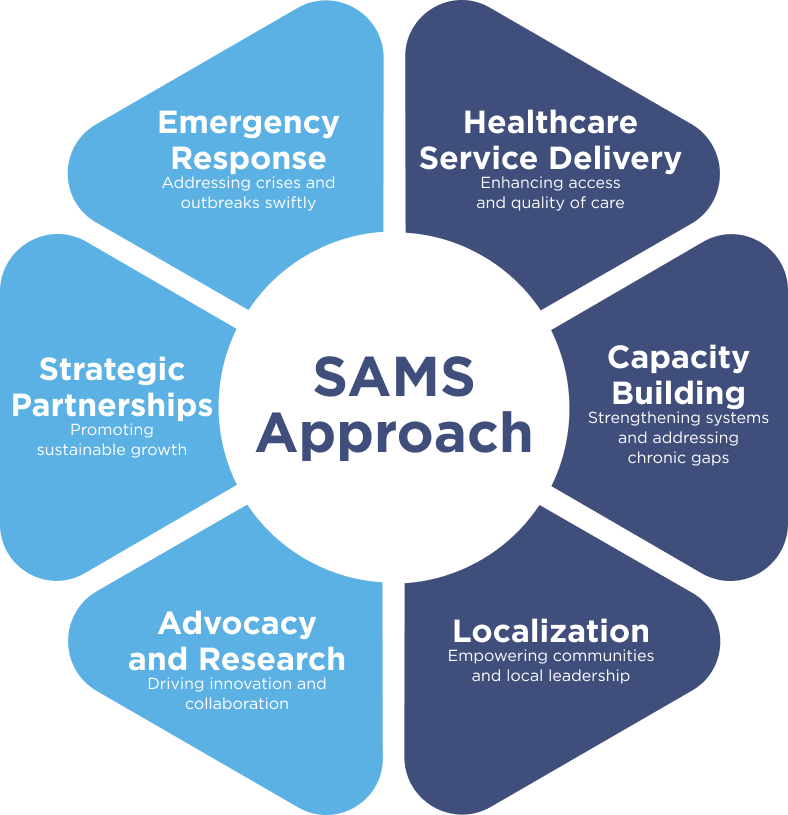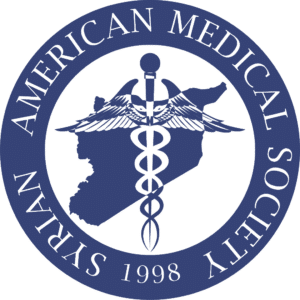Our Approach
We employ a comprehensive, multi-dimensional programmatic approach grounded in localization, sustainability, capacity building, and coordinated humanitarian action. This approach is led by our dedicated staff—especially those on the ground—and our Members who understand the specific needs of the communities they serve, ensuring our programs are responsive and locally owned. A core strength of our work lies in our ability to leverage the expertise and commitment of the Syrian diaspora, particularly medical professionals based in the United States. Their active engagement ensures that our programs remain Syrian-led and rooted in local knowledge while contributing to the long-term rebuilding of Syria’s health system.

Comprehensive Healthcare Service Delivery and Quality Enhancement
We deliver a full continuum of health services—from emergency and primary care to specialized secondary and tertiary care including surgeries and interventional procedures—while upholding the highest standards through systematic impact evaluation and staff development.
Our supported facilities include static clinics, mobile teams, and specialized hospitals offering pediatrics, reproductive health, dialysis, oncology, and COVID-19 care. Complementary programs include mental health and psychosocial support, physical therapy, and safe spaces for vulnerable populations. This pillar integrates continuous assessment of refugee healthcare needs, enabling us to dynamically adapt services using cost-effective, innovative approaches.
In all of our programming, we maintain our independence while closely coordinating with relevant local authorities—including Ministries of Health and Higher Education—as well as UN agencies, coordination bodies, and NGO forums. This ensures alignment with local health priorities while upholding humanitarian principles and enhancing the effectiveness and sustainability of our services.
Capacity Building and Addressing Chronic Healthcare Gaps
We address persistent gaps in chronic and specialized care by leveraging the expertise of our global member network to train and mentor healthcare workers inside Syria. Our programs include comprehensive coaching, consultation, and formal education for residents, nurses, and midwives, helping to build a sustainable and skilled health workforce. Our model also benefits significantly from sustained engagement with diaspora healthcare professionals who serve as instructors, mentors, and technical advisors across specialties. Their participation reinforces clinical excellence and supports the professional development of frontline providers through context-specific, peer-to-peer learning.
Localization and Community Leadership
We empower Syrians to evaluate, design, and lead humanitarian programs through a staff-led model that places local expertise and leadership at the heart of our response. Field-driven initiatives—such as the cochlear implant project—demonstrate our commitment to identifying and addressing critical, unmet health needs from within the community. Similarly, SAMS launched a retina intervention project, beginning with visiting volunteers who established initial services and training activities. The project is now transitioning into a fully localized initiative encompassing community awareness and screening, confirmation of diagnoses, case selection and prioritization, delivery of specialized interventions, and ultimately, patient rehabilitation and reintegration. By encouraging diaspora engagement in health system strengthening and national recovery, we leverage global expertise in support of locally driven rebuilding efforts. We also work in close coordination with local civil society actors and governance structures where possible to ensure community representation and locally anchored solutions.
Advocacy, Research, and Collaborative Innovation
We champion humanitarian access and the protection of civilians and healthcare workers, amplifying these critical issues globally. Through collaborative research and medical education, we contribute to evidence-based policymaking and develop innovative healthcare interventions for crisis and recovery contexts - focusing largely on supporting and advocating for survivors of torture, violence, and forced abduction Working closely with academic institutions in the US and the region and our vast network of Members who serve as technical advisors, we design and implement cutting-edge healthcare and education initiatives. These include telemedicine programs in mental health, virtual medical rounds with multidisciplinary teams, custom software applications to support adolescent psychosocial well-being and self-care, and hybrid training models that leverage both local and remote expertise. These programs and innovative approaches not only expand access to care and education in crisis settings but also strengthen health systems through sustainable, context-responsive solutions.
Strategic Partnerships and Sustainable Growth
We actively diversify and expand our outreach to donors, foundations, and institutional partners to secure sustained support. We coordinate with local, national, and international actors to ensure programmatic complementarity, avoid duplication, and strengthen the broader humanitarian response. We partner with academic institutions (in the US and MENA region) to strengthen our research and educational initiatives, and also with local academic institutions in Syria to build capacity, share knowledge, and integrate new and up-to-date courses into their curricula. Collaboration with Ministries of Health and Higher Education further supports the alignment of training programs with national standards while preserving our operational independence.
Emergency and Outbreak Response
We maintain expertise in managing communicable disease outbreaks—including cholera, leishmaniasis, polio, and COVID-19—and rapidly mobilize emergency medical relief in crises. Notable recent responses include trauma care and psychological support for healthcare workers following the earthquake in northern Syria, and the swift expansion of services across the Whole of Syria in the immediate aftermath of the regime’s fall in December 2024. These efforts are further bolstered by the diaspora’s rapid mobilization in times of crisis—through funding, technical support, and participation in emergency medical missions—ensuring that our response efforts are both immediate and informed by long-standing experience in Syrian healthcare.
